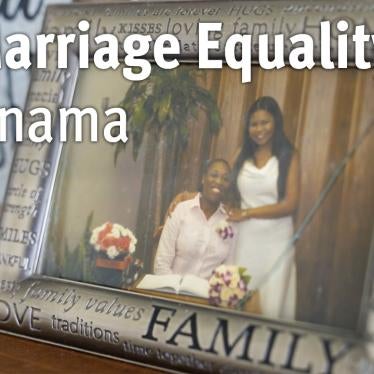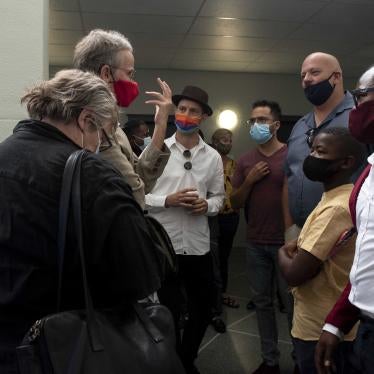March 16, 2022
H.E. President of the Republic of Kosovo, Ms. Vjosa Osmani
Office of the President of Kosovo
Assembly Building, “Mother Teresa” Square
10000 Prishtina, Republic of Kosovo
Prime Minister of the Republic of Kosovo, Mr. Albin Kurti
Government Building, “Mother Teresa” Square
10000 Prishtina, Republic of Kosovo
Minister of Justice, Albulena Haxhiu
Ministry of Justice
New Government Building, 7th Floor, Office 704
10000 Prishtina, Republic of Kosovo
Members of the Parliament of the Republic of Kosovo
Dear President Osmani, Prime Minister Kurti, Minister Haxhiu, and Members of Parliament,
We write concerning recent steps to adopt civil union for same-sex partners in Kosovo’s new Civil Code. Experience from other countries shows that the best way to ensure that same-sex couples enjoy the same protections as other couples, without discrimination, is to grant them access to the same institutions into which other couples may enter, including marriage itself. As lawmakers in Kosovo continue to legislate in this area, we urge them to end the exclusion of same-sex couples from marriage, rather than creating some new, other legal regime.
Uncertainty around the scope of civil unions puts same-sex couples and their families in Kosovo at risk. The Constitution of Kosovo does not envision gendered restrictions on the freedom to marry; article 37 of the Constitution of Kosovo recognizes that everyone has the right to marry and the right to have a family as provided by law.[1] Yet the Civil Code of Kosovo, adopted last year, discriminatorily restricts marriage to “a legally registered union of two spouses of different sexes,” excluding same-sex couples from the institution.[2] The Civil Code goes on to state that “[r]egistered civil unions between persons of the same sex are allowed,”[3] but does not provide any mechanism for registering or recognizing those unions, stating only that “[c]onditions and procedures are regulated by a special law.”[4] That law has yet to be drafted or enacted. As a result, while the Civil Code claims that “[m]arried people and partners in civil unions enjoy mutual rights and duties under this Code,” they do not enjoy equal access to rights and duties in practice.[5]
This uneven regime puts same-sex couples and their families on more tenuous footing than their heterosexual counterparts. Other constitutional and legislative provisions make clear that Kosovo aims to reject discrimination based on sexual orientation and gender identity. Article 24 of the Constitution of Kosovo prohibits discrimination based on gender, sexual orientation, or other personal status, among other grounds.[6] The Law on Protection from Discrimination similarly prohibits discrimination based on sex, gender, gender identity, sexual orientation, or any other basis.[7] The clearest way to ensure that same-sex couples and their families are protected from discrimination is to allow them access to the same institutions that heterosexual couples and their families can access.
The experiences of other countries, including in Europe, demonstrate that separate mechanisms created for same-sex couples as an alternative to marriage tend to fall short of the legal and social protections that marriage can provide.[8] Most countries that introduced civil union for same-sex couples as an alternative to marriage subsequently moved on to extend the freedom to marry, typically in response to the shortcomings that arose from discrimination experienced by those in civil unions in relation to issues such as portability, clarity, and security, and the resultant public pressure to deliver full equality.[9] In other jurisdictions, courts have concluded that creating a separate regime of civil partnerships is not a sufficient substitute for equal access to civil marriage.[10]
We believe that extending marriage to same-sex couples is the most rights-respecting option for Kosovo to pursue. Partnership recognition is a step forward – any protection is better than none – but civil union is unlikely to protect people’s rights to the same extent as equal marriage, and indeed, can signal continued inequality. Even where legal frameworks do provide for comparable protections, marriage carries a social, familial, and cultural weight that couples in civil partnerships do not necessarily enjoy.[11] To the extent that civil unions offer any advantages over marriage – for example, in being more flexible or imposing fewer duties on couples – those advantages should be available to all couples who want them.[12]
We hope that the Kosovo government will work to ensure that same-sex couples have the same rights as other couples, and to eradicate discrimination based on sexual orientation and gender identity in family law. We stand ready to offer information and advice – and look forward to legislation that ends discrimination in family law and offers the strongest possible protection for same-sex couples and their families.
We thank you for your attention and look forward to your earliest response.
Yours sincerely,
Graeme Reid
Director, LGBT Rights Program, Human Rights Watch
Evan Wolfson
Director, Freedom to Marry Global
[1] KUSHTETUTA E REPUBLIKËS SË KOSOVËS [Constitution of the Republic of Kosovo], art. 37, https://gzk.rks-gov.net/ActDetail.aspx?ActID=3702.
[2] Draft Civil Code of the Republic of Kosovo, art. 1138(1), https://civilcode-kosovo.org/wp-content/uploads/2021/12/PDF_Projektkodi-Civil_30.12.21.pdf. The Family Law also envisions marriage as a union of two people of different sexes. LIGJI PËR FAMILJEN I KOSOVËS [Kosovo Family Law], LIGJI NR. 2004/32, art. 14, https://gzk.rks-gov.net/ActDocumentDetail.aspx?ActID=2410.
[3] Draft Civil Code of the Republic of Kosovo, art. 1138(2), https://civilcode-kosovo.org/wp-content/uploads/2021/12/PDF_Projektkodi-Civil_30.12.21.pdf.
[4] Draft Civil Code of the Republic of Kosovo, art. 1138(2), https://civilcode-kosovo.org/wp-content/uploads/2021/12/PDF_Projektkodi-Civil_30.12.21.pdf.
[5] Draft Civil Code of the Republic of Kosovo, art. 1138(4), https://civilcode-kosovo.org/wp-content/uploads/2021/12/PDF_Projektkodi-Civil_30.12.21.pdf.
[6] KUSHTETUTA E REPUBLIKËS SË KOSOVËS [Constitution of the Republic of Kosovo], art. 24, https://gzk.rks-gov.net/ActDetail.aspx?ActID=3702.
[7] PËR MBROJTJEN NGA DISKRIMINIMI [Law on Protection from Discrimination], LIGJI NR. 05/L-021, art. 1, https://gzk.rks-gov.net/ActDocumentDetail.aspx?ActID=10924.
[8] Evan Wolfson, “20 Years of Marriage Equality: A Mountain of Evidence, Expertise, and Experience,” European Human Rights Law Review, vol. 1 (2021): 50-67.
[9] BBC, “Denmark Approves Same-Sex Marriage and Church Weddings,” June 7, 2012, https://www.bbc.com/news/world-europe-18363157; BBC, “Same-Sex Marriage Becomes Law in England and Wales,” July 17, 2013, https://www.bbc.com/news/uk-politics-23338279; France 24, “François Hollande Signs Same-Sex Marriage Into Law,” May 18, 2013, https://www.france24.com/en/20130518-france-gay-marriage-law-adoption.
[10] BBC, “Inter-American Court Backs Same-Sex Marriage,” Jan. 10, 2018, https://www.bbc.com/news/world-latin-america-42633891; BBC, “Austrian Supreme Court Rules in Favor of Same-Sex Marriage,” Dec. 5, 2017, https://www.bbc.com/news/world-europe-42243829; Kara Fox and Ana Melgar Zuniga, “Ecuador’s Highest Court Legalizes Same-Sex Marriage,” CNN, June 13, 2019, https://www.cnn.com/2019/06/13/americas/ecuador-same-sex-marriage-intl/index.html.
[11] See, for example, Australian Marriage Equality, “‘A Failed Experiment’: Why Civil Unions Are No Substitute for Marriage Equality,” 2009, https://www.aph.gov.au/DocumentStore.ashx?id=4726e827-5d5a-4558-ab81-72c2fbd45324&subId=299074.
[12] Owen Bowcott, “Ban on Heterosexual Civil Partnerships in UK Ruled Discriminatory,” The Guardian, June 27, 2018, https://www.theguardian.com/lifeandstyle/2018/jun/27/uk-ban-on-heterosexual-civil-partnerships-ruled-discriminatory.








